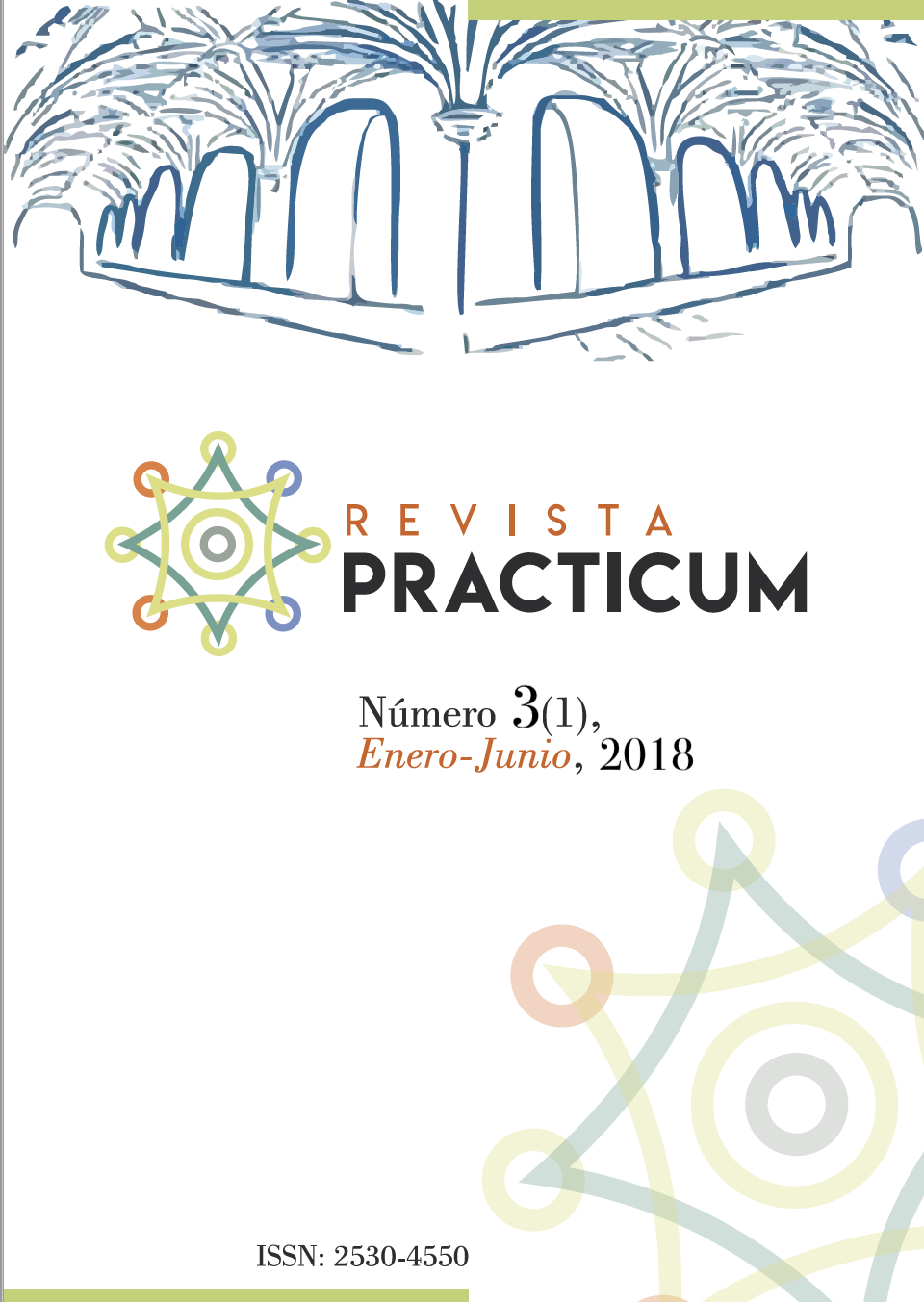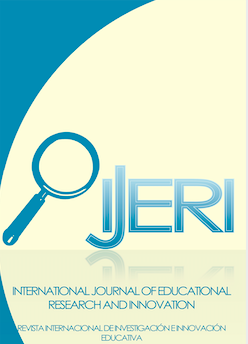Development environments and application of skills experience in Teaching degree in Univer-sity of Barcelona
DOI:
https://doi.org/10.24310/RevPracticumrep.v3i1.8271Keywords:
Competences, Practicum, Evaluation, Reflective practice, PortfolioAbstract
This paper presents partial results of a study in the Prácticum of the degree of Peda - gogy of University of Barcelona. Reflective Practice Seminars, the Portfolio and indivi - dual tutoring as learning environments with great potential for skills development are analyzed. We have developed a survey study applied to the students and the university tutors. The results have highlighted the positive ratings of these environments. On the - se bases and this curricular design, a series of questions arose which needed to be an - swered and which underlie the objectives of this work. To what extent did the expected learning environments have represented opportunities for development and application of competences?, Is it possible to distinguish a more proactive environment for the de - velopment of one type or another of competences?, Have all the competences treated with the same weight in the curriculum? Students and teachers appreciated the indicators that referred to reflective practice seminars very positively. The internship tutors of the University of Barcelona pointed out especially that they had been able to demonstrate the development / performance of transversal competences in their students during reflective practice seminars. All of these competences have been worked mostly explicitly by the University’s tutors.Downloads
Metrics
Publication Facts
Reviewer profiles N/A
Author statements
Indexed in
-
—
- Academic society
- N/A
- Publisher
- Universidad de Málaga
References
Armadans, I., Castrechini, A. y Aneas, A. (2013). Empleabilidad, practicas externas y autoregulación del aprendizaje en la universidad: propuestas y recomendaciones desde una perspectiva transdisciplinar (pp 159-167), En Muñoz P.C; Raposo, M.; González, M.; Martínez, M.E.; Zabalza, M.A. y Pérez Adolfo (coord.), Alejando las paralelas y acre-centando las perpendiculares. Experiencias a partir del prácticum en la UB. XII Sym-posium Internacional sobre el prácticum y las prácticas en empresas en la formación universitaria, Poio, Actas ISBN: 978-84-8408-719-9 CD.
Aneas, A.; Rubio, M. J. y Vilà, R. (2017) Portafolios digital y evaluación de las compe-tencias transversales en las prácticas externas del grado de Pedagogía de la Universi-dad de Barcelona. Educar, pp. 1-19. Accesible en: http://educar.uab.cat/article/view/ep-aneas-rubio-vila/878-pdf-es
Atkins, M.J. (1999). Oven-ready and self-basting: Taking stock of employability skills. Teaching in Higher Education, 4 (2), pp. 267-278.
Bueno, P. M. y Fitzgerald, V. L. (2004). Aprendizaje basado en problemas. Problem–Ba-sed Learning. Theoria, 13, 145-157.
Cano, E. (2008) La evaluación por competencias en la educación superior. Revista de currículum y formación de profesorado. 12(3), 1-16. https://recyt.fecyt.es/index.php/profesorado/article/view/42469
Clanchy, J., y Ballard, B. (1995). Generic skills in the context of higher education. Hig-her Education Research and Development, 14(2), pp. 155-166.
Domingo, A. (2009). El Prácticum en los nuevos planes de estudios . En M. Raposo , E. Martínez y L. Lodeiro (coord.) Formación vs Training (pp.125-131). Santiago de Com-postela, España: Imprenta Universitaria
Domingo, A. (2010). La práctica reflexiva en los estudios de Magisterio de la UIC . En Esteve O. (coord.). Creando mi profesión: Una propuesta para el desarrollo profesional del profesorado. (pp. 97-114) Barcelona, España: Octaedro.
Eraut, M. (2000). Non-formal learning and tacit knowledge in professional work. Bri-tish. Journal of Educational Psychology, 70, 113–136.
Harvey, L. (1999). New Realities: The Relationship between Higher Education and Em-ployment. Keynote presentation at the European Association of Institutional Research Forum, Lund, Sweden, August. Retrieved from the World Wide Web, April 15, 2002: http://www.uce.ac.uk/crq/publications/cp/eair99.html
Lave, J. y Chaiklin, S. (eds.) (1993) Understanding Practice: Perspectives on Activity and Context, Cambridge: University of Cambridge Press.
Millan, D.M.; Burguet, M.; Vilà, R; Aneas, A; Rajadell, N. y Noguera, E. (2014) PRA-XIS: el pràcticum al Grau de Pedagogia de la Universitat de Barcelona, Ridu. Revista d’innovació en docència universitària, 6 (en prensa).
Navío, A. (2006). Las competencias profesionales del formador. Una visión desde la formación continua. Barcelona: Octaedro.
Oser, F. K. y Baeriswyl, F. J. (2001). “Choreographies of Teaching: Bridging Instruction to Learning”. En Richardson, V. (Ed.): Handbook of Research on Teaching (4ª ed.). Was-hintong. AERA., 1031-1065.
Pimienta, J. (2011) Secuencias didácticas: aprendizaje y evaluación de competencias en educación superior. Bordón, 63 (1), 77-92
Rodríguez Espinar, S., Prades Nebot, A., Bernáldez Arjona, L. y Sánchez Castiñeira, S. (2010) Sobre la empleabilidad de los graduados universitarios en Catalunya: del diag-nóstico a la acción Revista de Educación, 351. pp. 107-137
Rodríguez, M. L., Serreri, P. y Del Cimmuto, A. (2010). Desarrollo de competencias. Barcelona: Laertes.
Tobón, S. (2010). Formacion integral y competencias. Pensamiento complejo, curriculo, didactica y evaluacion. Bogota, Colombia: ECOE Editores.
Vásquez, S (2011) Las comunidades de práctica. Educar, 47 (1), 51-68
Vilà, R. y Aneas, A. (2013) Los seminarios de práctica reflexiva en el Prácticum de Pe-dagogía de la Universidad de Barcelona en Bordón 65 (3), 2013, 165-18.
Vilà, R., Aneas, A. y Rajadell; N. (2015) La evaluación de competencias del alumnado en las Prácticas Externas. Procedia - Social and Behavioral Sciences. Procedia - Social and Behavioral Sciences, 196 (8), 226–232.
Vilà, R.; Burguet, M.; Aneas, A.; Rajadell, N.; Noguera, E.; Millan, D. (2014) El Pràc-ticum al Grau de Pedagogia de la Universitat de Barcelona: el mapa de la professió, la pràctica simulada i la immersió en una organització. REIRE. Revista d’Innovació i Re-cerca en Educació, 7 (1), 93-112.
Wenger, E. (2001). Comunidades de práctica: aprendizaje, significado e identidad. Pai-dós. ISBN: 84-493-1111-
Zabalza, M.A. (2011) El Prácticum en la formación universitaria: Estado de la cuestión, Revista de Educación, 354, 21-43
Downloads
Published
How to Cite
Issue
Section
License
Acceptance of the work implies that the author grants Revista Prácticum the exclusive rights to reproduce, distribute and sell his or her work worldwide, both in digital and paper formats, CD-ROM, etc.
Likewise, the authors shall grant Revista Prácticum the rights of dissemination, public communication on the Internet and IT networks, data buses, as well as any other portals or electronic devices for online consultation of its contents and extracts, under the conditions of the portal, repositories or databases where the work is stored.
Revista Prácticum allows authors to publish and disseminate their articles and works on their personal websites, research teams, institutional repositories and scientific databases. All this in accordance with the Creative Commons 4.0 License










8.png)








